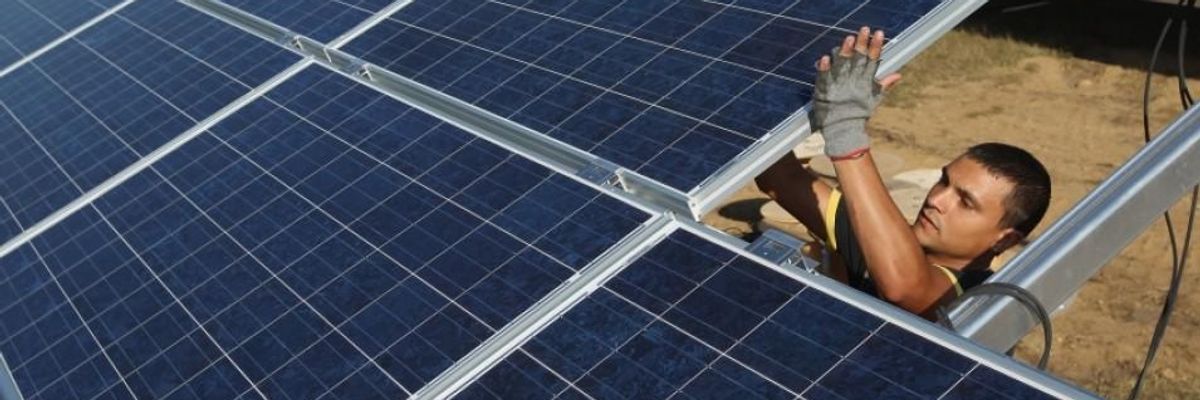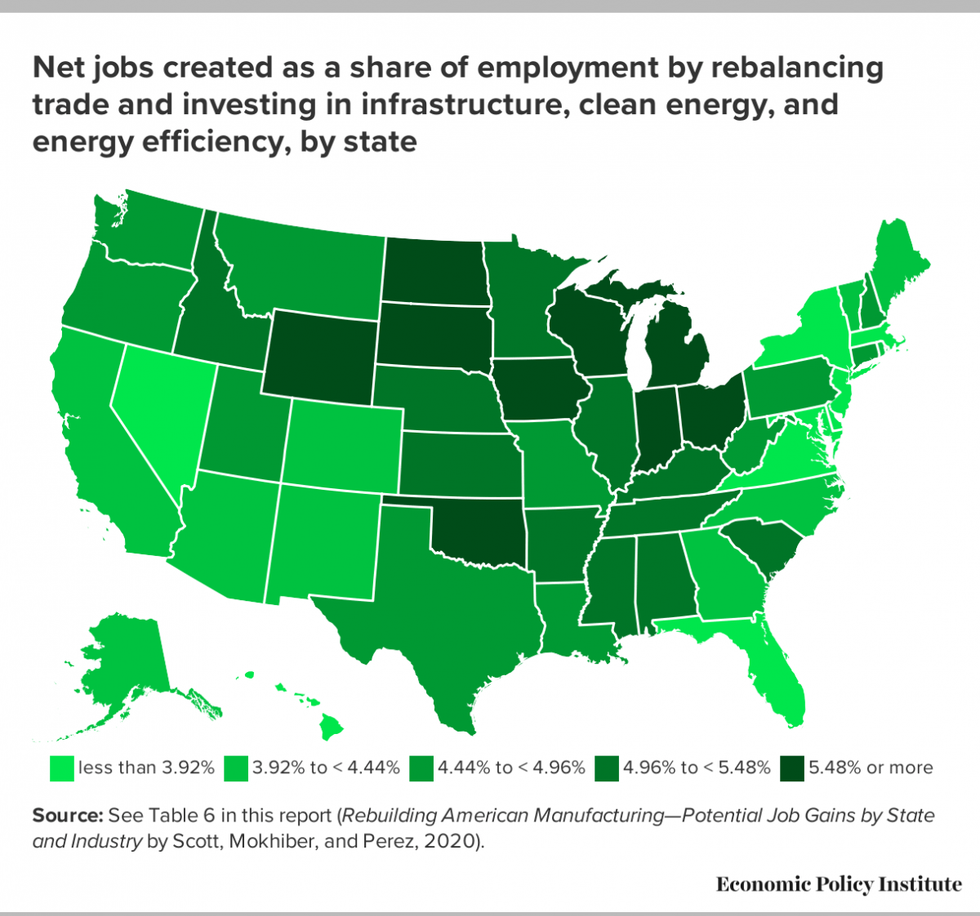Pursuing trade and industrial policies that boost U.S. exports and eliminate the trade deficit while investing $2 trillion over four years in the nation's infrastructure, clean energy, and energy efficiency improvements could support 6.9 to 12.9 million "good jobs" annually by 2024, according to an analysis published Tuesday.
"By rebalancing our currency and investing in desperately needed infrastructure upgrades, as well as clean energy alternatives, we could create millions of good jobs during the economic recovery."
--Robert Scott, EPIThe new report from a trio of experts at the Economic Policy Institute (EPI), a U.S.-based think tank, comes as the country continues to endure the public health and economic consequences of the ongoing coronavirus pandemic, which has claimed more than 220,000 lives and millions of jobs in the United States alone this year.
As hurricanes and wildfires made worse by human-caused climate change have ravaged communities in the U.S. and around the world throughout the pandemic, demands have mounted for policymakers to use the Covid-19 crisis as an opportunity to #BuildBackBetter by incorporating ambitious plans to address the planetary emergency in relief and recovery packages.
"Our policymakers urgently need to confront climate change and the deep recession caused by a global pandemic. One way to do this is investing a substantial part of our budget to reduce our carbon emissions while also creating good jobs," EPI data analyst Zane Mokhiber, who co-authored the report, said in a statement. "We don't have to choose between a strong economy or a healthy environment--we can have both."
EPI's experts note U.S economic issues preceded the pandemic, citing job losses due to growing trade deficits and a lack of infrastructure investment. They put forth a two-pronged strategy "for rebuilding the domestic economy around high-wage jobs and restoring American manufacturing."
Specifically, Mokhiber, EPI director of trade and manufacturing policy research Robert Scott, and research assistant Daniel Perez examine the impacts of:
- Trade and industrial policies that dramatically boost U.S. exports and eliminate the U.S. trade deficit--now roughly $850 billion--within four years. At the heart of these policies are measures to end the overvaluation of the U.S. dollar and rebuild the competitiveness of U.S. manufacturing industries.
- A four-year, $2 trillion program of investments in infrastructure, clean energy, and energy efficiency improvements. This would include investments of $70.2 billion per year in schools and broadband, which would have substantial social benefits. Note also that virtually all (91.6%) of clean energy and energy efficiency investments are for manufactured products.
The infrastructure and clean energy proposals examined in the report are based on a more ambitious plan developed by the Sierra Club and other civil society groups while the trade and manufacturing policy proposals were developed by the Alliance for American Manufacturing, which highlighted EPI's findings on Twitter Tuesday:
"Job losses due to growing U.S. trade deficits hit manufacturing industries particularly hard, shrinking the share of middle-class jobs available to workers without a college degree," explained Scott. "By rebalancing our currency and investing in desperately needed infrastructure upgrades, as well as clean energy alternatives, we could create millions of good jobs during the economic recovery. This program will bring jobs those who need them the most."
Under a scenario with 6.9 million new jobs, which the authors call a "conservative" projection, "rapidly growing sectors would include nondurable goods (367,600 jobs) and durable goods (2.1 million jobs)," the report says. "Within durable goods industries, the most jobs will be supported in nonelectrical machinery (436,700 jobs), fabricated metal products (383,700 jobs), transportation equipment (343,800 jobs), electrical equipment (302,700 jobs), and primary metals (248,000 jobs)."
"Good jobs would be created across the country if policymakers make such an investment a top priority," said Perez. "In particular, many states in the Midwest would gain thousands of good paying jobs that could revitalize communities that have been left behind by outsourcing and it is it is no accident that they stand to gain the most from a manufacturing-centered economic development program."
The report adds that "in general, job growth would be concentrated in the manufacturing-intensive areas of the country in the upper Midwest and the South which have been hardest hit by globalization and outsourcing, and especially by growing imports from China." The states that EPI experts believe would see the greatest job gains by share of total state employment are Wisconsin, North Dakota, Indiana, Iowa, Wyoming, Oklahoma, South Dakota, Michigan, Ohio, and Kentucky.
"Rebalancing trade by expanding exports, and expanding public investments in infrastructure, clean energy, and energy efficiency," the report concludes, "are the keys to generating at least 6.9 million good jobs, rebuilding American manufacturing and the U.S. economy."





